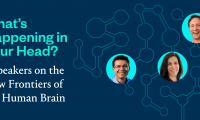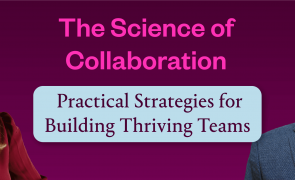ChatGPT Isn’t Magic. We Can—and Must—Understand It
 ChatGPT is “an exponential disruption,” says Kate Crawford. As a leading researcher and the author of Atlas of AI—which Nature called “meticulously researched and superbly written”—Kate has been on the cutting edge of AI for two decades. Her incisive and timely perspective has made her a go-to voice across the media. She says that generative AI is going to mark a fundamental shift in the way we see the world: it will revolutionize how we view not only tech, but everything from media to democracy. But it’s not magic. We have to understand how it works today if we want to tap into its massive potential and build the future we want.
ChatGPT is “an exponential disruption,” says Kate Crawford. As a leading researcher and the author of Atlas of AI—which Nature called “meticulously researched and superbly written”—Kate has been on the cutting edge of AI for two decades. Her incisive and timely perspective has made her a go-to voice across the media. She says that generative AI is going to mark a fundamental shift in the way we see the world: it will revolutionize how we view not only tech, but everything from media to democracy. But it’s not magic. We have to understand how it works today if we want to tap into its massive potential and build the future we want.
Listen to Kate on Why Is This Happening? The Chris Hayes Podcast: “We get so impressed by the ‘magic’ of the system that we don’t look at what it takes to make these things work: data at scale, an enormous amount of natural resources, and a lot of labor.”
Listen to Kate on Pivot, with Kara Swisher and Scott Galloway: “We need a rapid increase in literacy, and it’s not just going to be about focusing narrowly on the tech. It’s going to be about looking at what this does to the public sphere, to the media, to democracy.”
The First Generative AI Novel—and the Future of Creativity
 If you ask ChatGPT to write a novel, are you the creator or the consumer? Stephen Marche says you’re both. He was profiled in The New York Times last month for “writing” the first ever fully-AI-generated novella, Death of an Author, by extensively prompting three different generative AI programs. Stephen is a novelist with a PhD in Shakespeare who’s been following and writing about AI for years in outlets like The New Yorker and The Atlantic. He has a unique understanding of how the line between human and machine is blurring, and why the arts, the humanities, and human creativity are more important now than ever before.
If you ask ChatGPT to write a novel, are you the creator or the consumer? Stephen Marche says you’re both. He was profiled in The New York Times last month for “writing” the first ever fully-AI-generated novella, Death of an Author, by extensively prompting three different generative AI programs. Stephen is a novelist with a PhD in Shakespeare who’s been following and writing about AI for years in outlets like The New Yorker and The Atlantic. He has a unique understanding of how the line between human and machine is blurring, and why the arts, the humanities, and human creativity are more important now than ever before.
Read about Stephen in The New York Times: “I am the creator of this work, 100 percent. But, on the other hand, I didn’t create the words.”
Watch an exclusive Lavin interview with Stephen: “The Big Blur is coming: where the line between human and machine, and the line between creating and consuming, will blur. We’re going to start to figure out where human beings are actually required.”














